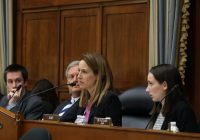Tag Archives: law
Google lawsuit could have downstream chilling effect on emerging tech startups
The U.S. government’s lawsuit alleging violations of antitrust laws by technology giant Google marks a new era of uncertainty for emerging startup companies in Southeast Michigan and beyond, according to Erik Gordon, a clinical assistant professor at the Stephen M. Ross School of Business. The immediate impact of the lawsuit, said Gordon in a recent story in Crain’s Detroit Business, will… Read More »
Online court tool that reduces disparities, virus spread wins annual U-M innovation award
For developing technology that’s helping to democratize the justice system while decreasing the spread of COVID-19, U-M law professor J.J. Prescott has earned this year’s Distinguished University Innovator Award. Prescott launched the U-M Online Court Project years ago to design and build technology to help people resolve minor disputes with the government and courts online and without the… Read More »
Federal Court rules in favor of UMSI professor in discrimination research case
A federal court has cleared the way for academic researchers, computer scientists, and journalists to continue work that investigates online company practices for racial, gender or other discrimination. The ruling means that those who research online companies no longer have to fear prosecution for the work they do to hold tech companies accountable for their practices, said Christian Sandvig, professor… Read More »
Privacy@Michigan speakers call for more privacy protection
Faculty, staff, and students gathered for a half-day of privacy related speakers and panels at Privacy@Michigan January 28 at the Rackham Building on the UM-Ann Arbor campus. Privacy@Michigan is an annual event hosted by ITS Information Assurance and the U-M School of Information in recognition of Data Privacy Day. If you missed it, you can watch the recordings… Read More »
CoE, SI react to allegations of misconduct by computer science professor Jason Mars
The faculty at U-M’s computer science and engineering department wrote a letter calling for professor Jason Mars to take a leave of absence, following an investigation from The Verge into his behavior as CEO of Clinc, an AI startup with ties to the school. Michigan’s School of Information also said it was suspending its recruiting relationship with Clinc due to Mars’… Read More »
Policies needed for online learners in 2020
Online learning plays a critical role for today’s students by offering greater flexibility to accommodate work schedules and, in many cases, creating more affordable pathways to credentials. However, concerns over quality and potential bad actors have inspired repeated attempts to regulate distance education in a manner that appropriately balances innovation with quality assurance and consumer protections. In a… Read More »
U.S. universities confront a security storm in Congress
Sol Bermann, U-M’s chief information security officer, is quoted in a recent article in “Science” magazine about legislation moving through Congress that aims to prevent foreign entities from taking unfair advantage of the traditionally open U.S. research system. Both House and Senate bills focus heavily on enhancing cybersecurity, seen as an essential tool in protecting intellectual property and… Read More »
More light needed on medical ‘shadow’ records
Official medical records are protected by strict privacy laws. But everyone who wears a fitness tracker, uses a health app, shops online, searches the internet for health information, or posts about their health creates a “shadow record” of that data. A team led by U-M researchers Nicholson Price and Kayte Spector-Bagdady reviewed current laws and regulations surrounding these… Read More »
The web really isn’t worldwide – every country has different access
What the internet looks like to users in the U.S. can be quite different from the online experience of people in other countries. Some of those variations are due to government censorship, but private companies – many based in the U.S. – are also building obstacles to users from around the world who want to freely explore the… Read More »
Fragmented U.S. privacy laws leave large data loopholes
Florian Schaub, an assistant professor at U-M and a privacy expert, notes in a recent article that the patchwork of U. S. laws and regulations that govern data collection and privacy leave loopholes for companies to exploit. For example, Federal laws strictly protect medical, financial, and education-related records. However, online services, apps, and data collection by emerging technologies… Read More »
Net neutrality and you
The Federal Communications Commission (FCC) voted to end net neutrality on Thursday, which could mean the end of the open internet as we know it. In an interview with “Mashable”, Florian Schaub, assistant professor of information, discusses what internet users need to know about the decision and how it might impact access. Despite the quick vote from the FCC, throttled… Read More »
Court case could affect your digital privacy
A case pending before the Supreme Court could affect all Americans’ digital privacy for decades to come, according to H.V. Jagadish, professor of electrical engineering and computer science. The case involves the appeal of man whose conviction for armed robbery was based, in part, on location data provided without a warrant to the F.B.I. by his cellphone provider. Jagadish, whose… Read More »
Online discrimination
In cyberspace, as in real life, it’s unlawful to discriminate against job candidates on the basis of age, race, nationality, disability, religion, or gender. But proving such bias is a challenge because the Computer Fraud and Abuse Act, an anti-hacking law passed thirty years ago, makes it illegal to use some of the more common practices for detecting… Read More »













